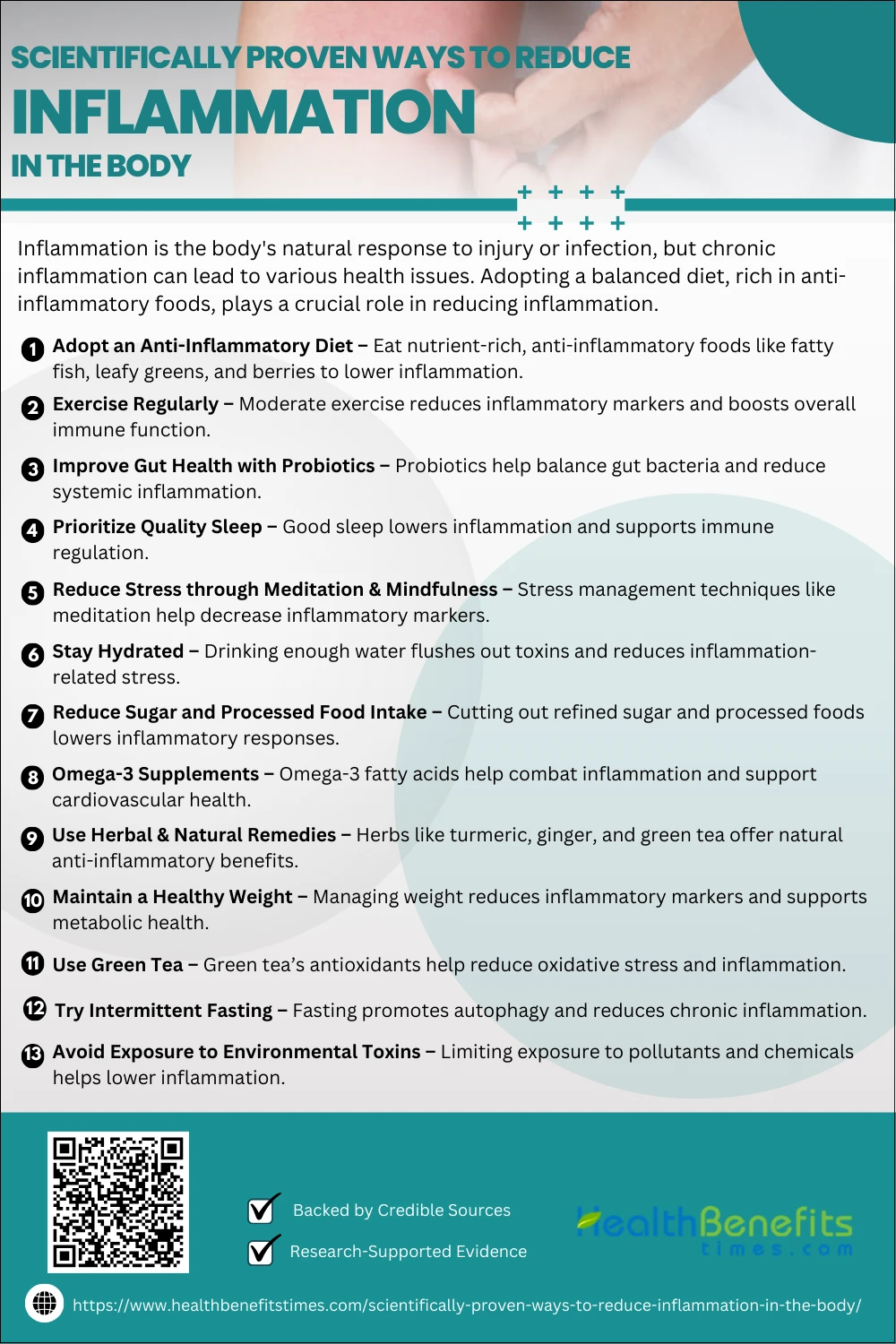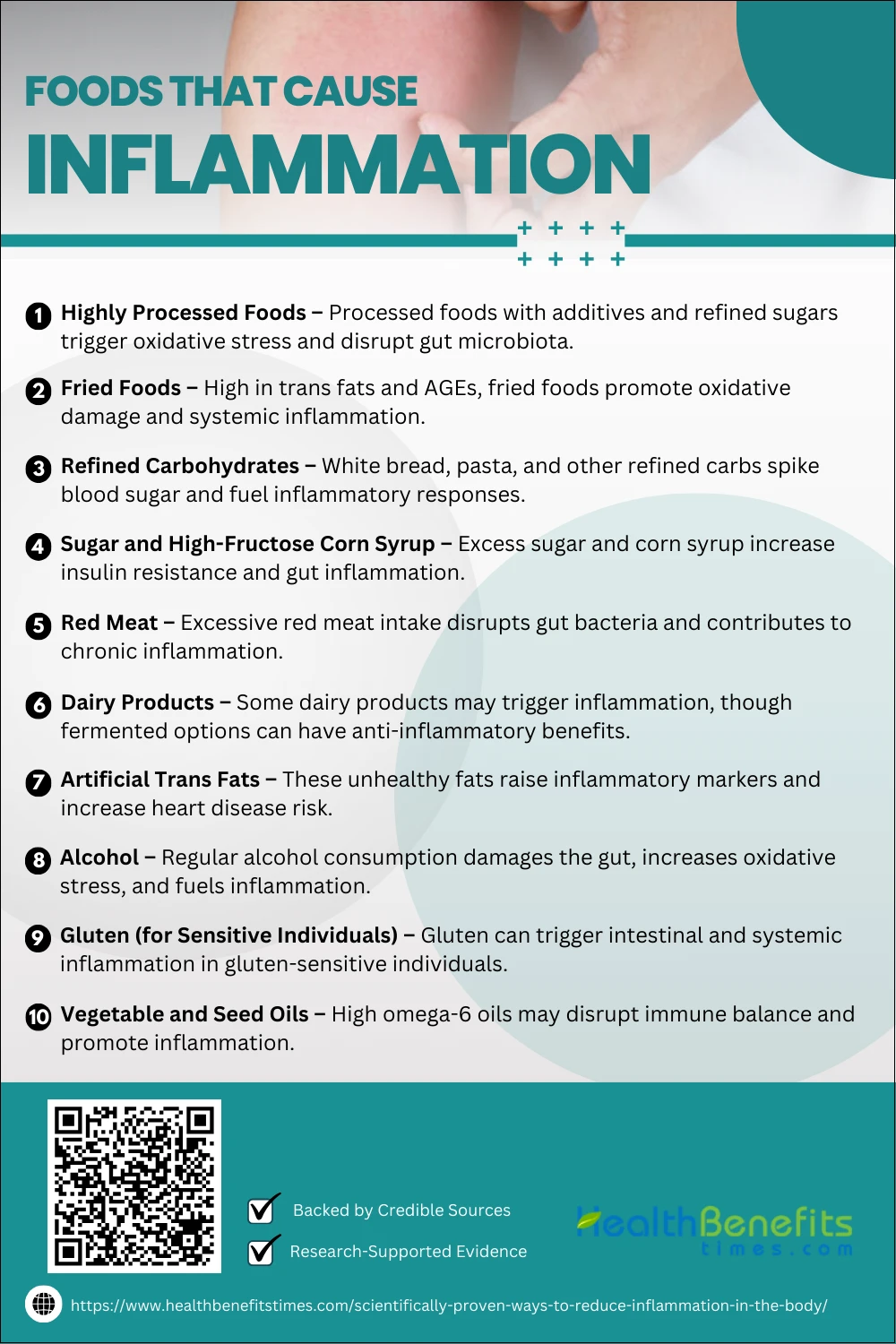- Inflammation is the body’s natural response to injury or infection, but chronic inflammation can lead to various health issues.
- Adopting a balanced diet, rich in anti-inflammatory foods, plays a crucial role in reducing inflammation.
- Regular physical activity and stress management are also effective in lowering inflammation and improving overall health.
 Inflammation is the body’s natural immune response to injury, infection, or harmful stimuli, playing a crucial role in healing and defense mechanisms. However, chronic inflammation, which persists over time, can contribute to various diseases, including heart disease, diabetes, and autoimmune disorders. Recent research highlights that lifestyle and dietary interventions can significantly reduce chronic inflammation and improve overall health. Consuming anti-inflammatory foods such as omega-3-rich fish, leafy greens, and nuts has been shown to lower inflammatory markers in the body. Additionally, regular physical activity and stress management techniques like meditation and deep breathing exercises help mitigate inflammation by regulating immune responses. Avoiding processed foods, excessive sugar, and unhealthy fats is also crucial, as these dietary factors can trigger pro-inflammatory pathways. Scientific evidence also suggests that gut health plays a vital role in controlling inflammation, with probiotics and fermented foods supporting a balanced microbiome. Furthermore, emerging studies reveal the potential of natural supplements such as turmeric, ginger, and green tea in modulating inflammatory processes. Lastly, ensuring adequate sleep and minimizing exposure to environmental toxins are additional strategies that have been scientifically validated to lower inflammation levels. By integrating these evidence-based approaches into daily life, individuals can effectively reduce chronic inflammation and promote long-term well-being.
Inflammation is the body’s natural immune response to injury, infection, or harmful stimuli, playing a crucial role in healing and defense mechanisms. However, chronic inflammation, which persists over time, can contribute to various diseases, including heart disease, diabetes, and autoimmune disorders. Recent research highlights that lifestyle and dietary interventions can significantly reduce chronic inflammation and improve overall health. Consuming anti-inflammatory foods such as omega-3-rich fish, leafy greens, and nuts has been shown to lower inflammatory markers in the body. Additionally, regular physical activity and stress management techniques like meditation and deep breathing exercises help mitigate inflammation by regulating immune responses. Avoiding processed foods, excessive sugar, and unhealthy fats is also crucial, as these dietary factors can trigger pro-inflammatory pathways. Scientific evidence also suggests that gut health plays a vital role in controlling inflammation, with probiotics and fermented foods supporting a balanced microbiome. Furthermore, emerging studies reveal the potential of natural supplements such as turmeric, ginger, and green tea in modulating inflammatory processes. Lastly, ensuring adequate sleep and minimizing exposure to environmental toxins are additional strategies that have been scientifically validated to lower inflammation levels. By integrating these evidence-based approaches into daily life, individuals can effectively reduce chronic inflammation and promote long-term well-being.
Understanding Inflammation
Chronic inflammation is a prolonged immune response triggered by factors such as obesity, poor diet, infections, and environmental toxins. Obesity-related inflammation arises due to excess fat cells that release pro-inflammatory cytokines, leading to metabolic disorders and cardiovascular diseases. Additionally, autoimmune diseases such as rheumatoid arthritis and lupus drive persistent inflammation, damaging healthy tissues over time. Long-term exposure to environmental pollutants, smoking, and processed foods further contribute to chronic inflammatory conditions by altering immune system responses.
Several common inflammatory diseases have been linked to chronic immune activation. Rheumatoid arthritis is an autoimmune disorder that causes joint inflammation and severe pain. Asthma is a chronic airway disease associated with inflammatory pathways that lead to respiratory distress. Inflammatory bowel diseases (IBD), such as Crohn’s disease and ulcerative colitis, result from abnormal gut immune responses that trigger chronic inflammation. Psoriasis, a chronic skin condition, is marked by immune-driven inflammation causing scaly patches on the skin. Lastly, prolonged systemic inflammation has been linked to cardiovascular diseases, increasing the risk of heart attacks and strokes. Understanding these conditions and their inflammatory origins is key to developing effective prevention and treatment strategies.
Scientifically Proven Ways to Reduce Inflammation in the Body
Chronic inflammation is linked to various health issues, including heart disease and arthritis. Adopting science-backed strategies—like diet, exercise, stress management, and sleep—can help reduce inflammation and improve overall well-being.
1. Adopt an Anti-Inflammatory Diet
An anti-inflammatory diet focuses on whole, nutrient-rich foods that help reduce chronic inflammation and support overall health. Consuming foods rich in omega-3 fatty acids, such as fatty fish and flaxseeds, can significantly decrease pro-inflammatory cytokines and oxidative stress. (1) The Mediterranean diet, which emphasizes fruits, vegetables, nuts, and olive oil, has been linked to lower inflammation levels in various chronic conditions. (2) Studies also suggest that a plant-based diet can reduce inflammatory markers and improve gut microbiome health. (3) Polyphenol-rich foods like berries and green tea have demonstrated anti-inflammatory effects, reducing the risk of cardiovascular diseases. (4) Additionally, fiber intake from whole grains and legumes is essential for gut health and inflammation control Marta, 2024.
2. Exercise Regularly
Regular physical activity is a proven strategy to reduce chronic inflammation and improve immune function. Moderate exercise helps decrease inflammatory markers like C-reactive protein (CRP) and boosts anti-inflammatory cytokines, contributing to overall health. (5) Aerobic activities such as brisk walking and cycling have been linked to reductions in systemic inflammation and improved metabolic health. (6) Strength training also plays a role in reducing inflammation by enhancing muscle function and reducing pro-inflammatory factors. (7) Additionally, a combination of diet and exercise has been shown to provide the most effective reduction in inflammation levels. (8) Research suggests that even low-intensity exercises, such as yoga or stretching, can significantly improve inflammatory responses and enhance overall well-being. (9)
3. Improve Gut Health with Probiotics
Probiotics play a crucial role in maintaining gut health and reducing systemic inflammation by balancing the microbiome. Studies have shown that probiotic supplementation can improve gastrointestinal function, lower inflammation, and enhance metabolic health. (10) Additionally, probiotics aid in cardiovascular health by reducing oxidative stress and inflammatory markers. (11) A balanced gut microbiota has been linked to reduced risks of metabolic disorders such as diabetes and hypertension. (12) Probiotic strains like Bifidobacterium and Lactobacillus have been shown to strengthen the gut barrier, preventing harmful toxins from triggering inflammation. (13) Furthermore, recent research suggests that probiotics can positively impact mental health by reducing neuroinflammation and improving cognitive function. (14)
4. Prioritize Quality Sleep
Sleep plays a critical role in regulating immune function and reducing inflammation. Research indicates that poor sleep quality leads to elevated levels of inflammatory cytokines, which contribute to chronic diseases. (15) A consistent sleep schedule helps lower stress-induced inflammation and improves overall health outcomes. (16) Melatonin, the hormone responsible for sleep regulation, has also been found to have anti-inflammatory effects, reducing oxidative stress in the body. (17) Catching up on sleep over the weekend does not fully reverse the inflammatory effects of sleep deprivation, making it essential to prioritize nightly rest. (18) Furthermore, studies show that individuals who sleep for less than six hours a night have higher risks of cardiovascular disease and systemic inflammation. (19)
5. Reduce Stress through Meditation & Mindfulness
Meditation and mindfulness are effective stress-reduction techniques that lower inflammatory markers and promote overall well-being. Studies show that mindfulness-based practices significantly reduce cortisol levels, which are linked to chronic inflammation. (20) Psychological interventions, including meditation, have been shown to help manage inflammatory conditions like rheumatoid arthritis. (21) Research suggests that yogic breathing techniques improve immune function and reduce stress-induced inflammation. (22) Cognitive-behavioral interventions such as guided meditation can lower systemic inflammation by influencing brain-body interactions. (23) Regular mindfulness practices also reduce anxiety and depression, contributing to lower levels of inflammatory cytokines. (24)
6. Stay Hydrated
Proper hydration plays a key role in maintaining homeostasis and reducing inflammation in the body. Drinking sufficient water helps flush out toxins that contribute to oxidative stress and inflammatory responses. (25) Research suggests that staying hydrated supports joint lubrication and reduces inflammation-related pain, particularly in arthritis patients. (26) Proper hydration is also linked to lower risks of cardiovascular inflammation and improved circulation. (27) Hydration influences gut health, as dehydration can lead to imbalances in gut microbiota, which trigger inflammatory processes. (28) Additionally, maintaining adequate hydration levels can prevent kidney stress, which is associated with systemic inflammation and metabolic disorders Muhammad et al., 2024.
7. Reduce Sugar and Processed Food Intake
Reducing sugar and processed food intake significantly decreases inflammation and improves overall health. Diets high in refined sugar contribute to systemic inflammation and oxidative stress, which can lead to chronic diseases like diabetes and cardiovascular issues. (29) Studies highlight that excessive sugar disrupts gut microbiota, increasing inflammatory markers. (30) Processed foods containing artificial additives and unhealthy fats further trigger inflammatory responses. (31) Opting for whole foods, fiber-rich diets, and natural antioxidants helps mitigate these effects. (32) A Mediterranean-style diet, rich in anti-inflammatory components, is highly recommended for lowering inflammation. (33)
8. Omega-3 supplements
Omega-3 fatty acids, particularly EPA and DHA, play a crucial role in reducing inflammation and improving immune function. These essential fatty acids modulate inflammatory pathways, reducing cytokine production associated with chronic diseases. (34) Research supports that omega-3 supplementation lowers levels of inflammatory markers like C-reactive protein (CRP) and interleukin-6. (29) Additionally, omega-3s contribute to cardiovascular health by reducing arterial inflammation. (30) Regular intake has also been linked to improved joint health and reduced symptoms in conditions like rheumatoid arthritis. (31) Including omega-3-rich foods, such as fatty fish or flaxseeds, further enhances its anti-inflammatory benefits. (32)
9. Use Herbal & Natural Remedies
Herbal and natural remedies offer effective ways to combat inflammation. Essential oils from plants like Artemisia and Mentha exhibit potent anti-inflammatory properties. (35) Propolis, a bee-derived substance, has shown significant anti-inflammatory effects. (36) Hedeoma piperita, a medicinal herb, demonstrates antioxidant and anti-inflammatory benefits. (37) Chili peppers contain capsaicin, which reduces inflammatory responses. (38) Additionally, ursolic acid from medicinal plants has been found to suppress pro-inflammatory signaling pathways. (39)
10. Maintain a Healthy Weight
Maintaining a healthy weight is crucial for reducing inflammation and improving metabolic health. Excess weight increases inflammatory markers, while weight loss lowers them significantly. (40) Research highlights that gut microbiota balance plays a vital role in weight regulation and inflammation reduction. (41) High-fat diets contribute to adipose tissue inflammation, while dietary modifications can reverse these effects. (42) Microbiota-derived metabolites have been found to alleviate inflammatory responses in obesity-related conditions. (43) Additionally, weight loss through bariatric surgery has been shown to lower systemic inflammation in obese patients. (44)
11. Use Green Tea
Green tea contains polyphenols, such as epigallocatechin gallate (EGCG), that exhibit strong anti-inflammatory properties. (45) Studies show that green tea consumption reduces oxidative stress and inflammatory cytokines, promoting overall health. (46) Its catechins also help in modulating immune responses, preventing chronic inflammation (Samavat & Salehi Vozhdehnazari, 2024). Additionally, green tea aids in weight management, further reducing inflammation linked to obesity. (47) Regular intake of green tea has been associated with improved cardiovascular health and lower risks of inflammatory diseases. (48)
12. Try Intermittent Fasting
Intermittent fasting has been shown to reduce inflammation by lowering oxidative stress and inflammatory markers. Fasting enhances autophagy, a cellular process that removes damaged cells and reduces chronic inflammation. (49) It also decreases insulin resistance, reducing pro-inflammatory cytokines in the body. (49) Studies suggest that fasting can improve gut health by modulating the microbiome and decreasing inflammation-related disorders. (46) Additionally, intermittent fasting has been linked to reduced risks of cardiovascular diseases through lowered inflammatory biomarkers. (50) Overall, this dietary practice promotes longevity and metabolic health. (48)
13. Avoid Exposure to Environmental Toxins
Exposure to environmental toxins, such as heavy metals and air pollutants, significantly contributes to inflammation and chronic diseases. Research suggests that antioxidants help mitigate oxidative stress caused by pollutants. (51) Detoxification strategies, including dietary interventions, can reduce toxin accumulation and inflammation. (52) Studies show that endocrine disruptors found in plastics and pesticides exacerbate inflammatory responses. (53) Heavy metals used in dental and medical applications also pose inflammatory risks. (54) Additionally, microplastic contamination in food has been linked to immune system dysregulation and inflammation. (55)
Foods That Cause Inflammation
Certain foods can trigger inflammation in the body, leading to various health issues. Identifying and avoiding these foods is crucial for maintaining overall well-being and preventing chronic conditions.
1. Highly Processed Foods
Highly processed foods, rich in additives and refined sugars, are linked to increased inflammation by triggering oxidative stress and altering gut microbiota. A study published in MDPI Antioxidants (56) highlights their role in systemic inflammation. Similarly, research in IntechOpen (57) explains how processed food consumption activates pro-inflammatory cytokines, contributing to chronic diseases. Furthermore, findings in the Journal of Research and Biology (58) suggest that long-term consumption may impair immune function.
2. Fried Foods
Fried foods, high in trans fats and advanced glycation end products (AGEs), promote chronic inflammation by increasing oxidative damage. A study in ResearchGate (59) associates frequent fried food intake with heightened gastric inflammation. Additionally, research in Springer (60) links fried foods to gut microbiome alterations, exacerbating inflammatory responses. A CEEOL (61) study further confirms their contribution to endothelial dysfunction and systemic inflammation.
3. Refined Carbohydrates
Refined carbohydrates, such as white bread and pasta, elevate blood sugar levels, triggering inflammatory responses in the body. Research in Springer (62) highlights their role in promoting oxidative stress. A study from Taylor & Francis (29) emphasizes how excessive intake can disrupt metabolic health. Similarly, findings from Nature (63) reveal refined carbohydrates’ link to chronic inflammation.
4. Sugar and High-Fructose Corn Syrup
Sugar and high-fructose corn syrup drive inflammation by increasing insulin resistance and oxidative stress. A study in Academia.edu (64) identifies high-fructose corn syrup as a major pro-inflammatory agent. Research in Physiology.org (65) links excessive sugar consumption to metabolic disturbances. Another study in Springer (60) associates high sugar intake with gut microbiome imbalances and chronic inflammation.
5. Red Meat
Consumption of red meat has been linked to inflammation due to its impact on gut microbiota and oxidative stress. Studies suggest that red meat intake can contribute to chronic inflammation, increasing the risk of metabolic disorders and cardiovascular diseases. (40) Research also indicates that high consumption disrupts gut microbial balance, leading to inflammatory responses. Furthermore, dietary components in red meat have been linked to hormone imbalances that exacerbate inflammatory pathways. (66)
6. Dairy Products
The relationship between dairy products and inflammation is complex, with some studies suggesting both pro-inflammatory and anti-inflammatory effects. Certain dairy products may alter gut microbiota composition, contributing to inflammation in susceptible individuals. (40) Conversely, fermented dairy products such as yogurt have been associated with protective effects against inflammation. (60) A comparative study of dairy casein types further highlights the variable impact of dairy consumption on inflammation and overall gut health. (67)
7. Artificial Trans Fats
Artificial trans fats contribute to chronic inflammation by increasing oxidative stress and impairing endothelial function. Studies have linked their consumption to heightened inflammatory markers and cardiovascular disease risk. Research also suggests trans fats negatively affect lipid metabolism, leading to systemic inflammation. Furthermore, nutrigenomics studies highlight their role in gene expression changes associated with inflammatory diseases. (68)
8. Alcohol
Chronic alcohol consumption promotes inflammation by disrupting immune signaling and increasing oxidative stress. Research shows alcohol-induced gut damage exacerbates systemic inflammation and metabolic disorders. (69) Studies also reveal alcohol’s role in liver fibrosis, where inflammation drives progressive liver disease. (70) Additionally, habitual alcohol intake has been linked to vascular inflammation, increasing cardiovascular risk. (71)
9. Gluten (for Sensitive Individuals)
Gluten consumption may trigger inflammation, especially in individuals with celiac disease or non-celiac gluten sensitivity. Studies show even small amounts can cause chronic intestinal inflammation and immune activation. Research also links gluten to neuroinflammation, potentially worsening neurological symptoms. (72) Furthermore, gluten-induced inflammation has been associated with malabsorption syndromes and gut permeability issues. (73)
10. Vegetable and Seed Oils
Vegetable and seed oils high in omega-6 fatty acids may contribute to chronic inflammation by altering lipid metabolism and immune responses. Research highlights their role in increasing pro-inflammatory markers in metabolic disorders. (74) Some studies suggest an imbalance of omega-6 to omega-3 in these oils exacerbates inflammatory pathways. (75) Additionally, excessive consumption has been linked to oxidative stress and inflammatory skin conditions. (76)
Myths and Facts about Inflammation in the body
Inflammation is a natural response of the immune system, but there are many misconceptions about its role in health and disease. Let’s explore common myths and the scientific facts behind them.
1. Myth: All Dairy Products Cause Inflammation

2. Myth: Inflammation Is Always Bad for Your Health

3. Myth: Melatonin Is Only for Sleep

4. Myth: Anti-Inflammatory Diets Work for Everyone

5. Myth: Exercise Increases Inflammation

6. Myth: Sugar Is the Sole Cause of Inflammation

7. Myth: Chronic Inflammation Has Obvious Symptoms

8. Myth: NSAIDs (Ibuprofen, Aspirin) Are the Best Solutions for Inflammation

9. Myth: Fasting Increases Inflammation

10. Myth: Stress Doesn’t Affect Inflammation

Conclusion
In conclusion, incorporating anti-inflammatory practices into your daily routine can significantly improve your health. Regular exercise, a balanced diet rich in antioxidants, adequate sleep, and stress management are all scientifically proven methods to reduce inflammation in the body. By making these lifestyle adjustments, you can help prevent chronic inflammation and its associated risks, ultimately promoting a healthier, more vibrant life.




